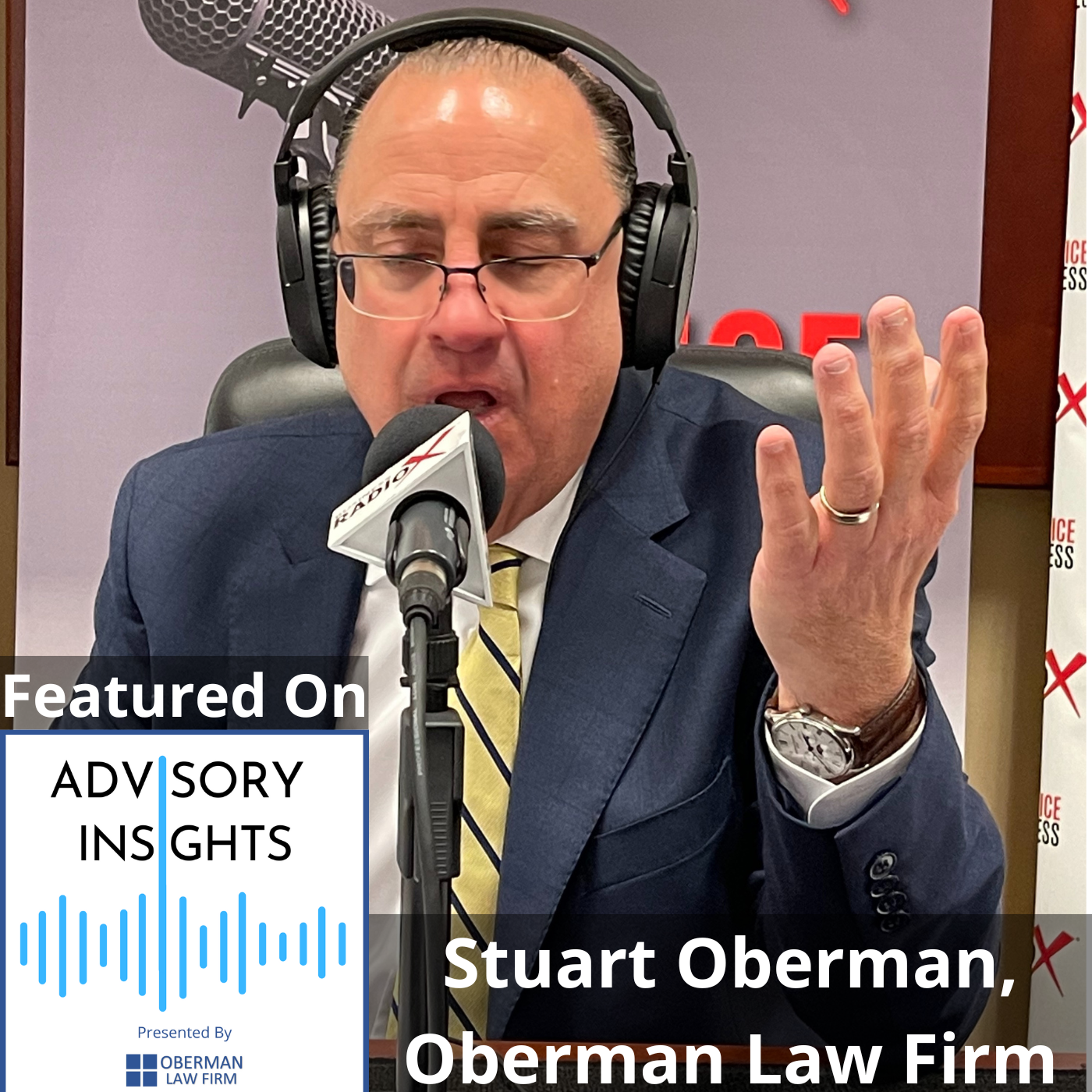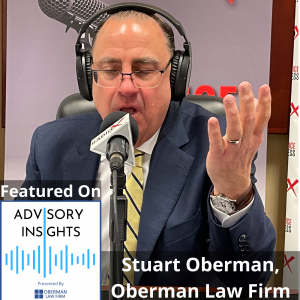

Employer Personal Appearance Policies Should Be Reviewed (Advisory Insights Podcast, Episode 35)
On this episode of Advisory Insights, Stuart Oberman of Oberman Law Firm urges employers to review their employee manuals for potentially discriminatory personal appearance policies. He cites the recent CROWN Act as an example of legislation that prohibits discrimination based on hairstyle or hair texture.
Advisory Insights is presented by Oberman Law Firm and produced by the North Fulton studio of Business RadioX®. The series can be found on all the major podcast apps. You can find the complete show archive here.
TRANSCRIPT
Intro: [00:00:01] Broadcasting from the Studios of Business RadioX, it’s time for Advisory Insights. Brought to you by Oberman Law Firm, serving clients nationwide with tailored service and exceptional results. Now, here’s your host.
Stuart Oberman: [00:00:20] And welcome everyone to Advisory Insights. This is Stuart Oberman. And here we go, folks, a little H.R., H.R., H.R. So, we do a substantial amount of employment law in our firm, Oberman Law Firm, and we review on a local, national, regional basis employee manuals.
Stuart Oberman: [00:00:44] So, I don’t ever remember reading an employee manual that did not have some kind of policy in place regarding personal appearance. Now, I want you to stop right there. Before you do anything else today, I want you to take out that policy. I want you to review it. And I want you to take a look at, one, is it discriminatory? Two, if this ever got out in public and it’s on the front page of The New York Times, or three, if this hits social media, would you be embarrassed by your policy? Or does it have a specific job related function?
Stuart Oberman: [00:01:31] So, the reason why I say that is because incidences are constantly hitting our desk, the news regarding potentially discriminatory and really utterly ridiculous policies and procedures that have nothing to do with work, quality of work, but they all relate to personal appearance – personal appearance.
Stuart Oberman: [00:02:01] Now, life is what it is, and everyone has their own personal appearance. Some are not as fortunate as others. Some come from different backgrounds, race, color, creed, sex, origin. Nothing is the same when we deal with appearance. But I want you to look to make sure these policies and procedures are not discriminatory.
Stuart Oberman: [00:02:26] And I want to take one example. So, a published report came out not too long ago regarding a particular company that, essentially, prohibited the hiring of applicants that have missing, broken, or badly discovered teeth, that, in all likelihood, is unrelated to a disability. Now, my question is, why would my employers have that in their employee manual? What could possibly be the reason for that?
Stuart Oberman: [00:03:11] Now, again, things happen, life happens, and people are in bad accidents, and people go through rough times in life. I want you to take a look at whether or not your policies and procedures take those circumstances into account. If a person is in an accident, how do you enforce this? If a person is a great candidate, but for some reason they don’t have that million dollar smile, and they don’t have that Hollywood look, what is your policy on that? Is it written? And first of all, why do you have a policy on that? Do you realize how much trouble that can get an employer in if they have that?
Stuart Oberman: [00:03:56] I don’t want to necessarily spend a whole lot of time on this because, again, we look at so many things regarding this particular issue, but this comes to the forefront of are you reviewing your policies and procedures? One. Two, do you have an appearance policy in your manual? Now, it’s different if you have a policy that says if you have a tattoo covered up, I get that. Is that fine? Absolutely. That’s fine.
Stuart Oberman: [00:04:27] But, you know, you’ve got to take a look at personal appearance in relation to medical, cultural, and religious reasons. Let me go through that. When you review your policy and procedures as far as appearance goes, and personal conduct and appearance, are you accommodating those persons based upon medical, cultural, or religious reasons. And then, we all know what happens to legislation that occurs.
Stuart Oberman: [00:05:05] So, in a recent legislation, the CROWN Act, which was essentially a congressional bill, prohibited discrimination based upon a person’s hair texture or hairstyle, and that style or culture is commonly associated with a particular race or national origin. Now, that failed to pass in 2022. Now, the fact that that even became a bill in Congress is an issue. But what’s happened is, states have taken their own version of that and enacted that.
Stuart Oberman: [00:05:55] So, if you have that particular legislation in your state, you have to look at your policies and procedures and make sure it does not have discrimination based upon medical, cultural or religious reasons. Because if it does, you’re going to have a world of problems going down the road. And, again, do you really want that manual provision to hit social media? Because if it does, it doesn’t come off social media.
Stuart Oberman: [00:06:30] Folks, again, I could spend all day on that topic. But top of mind, again, I want our employers to look at what’s going on in their employee manuals and their H.R. and compliance.
Stuart Oberman: [00:06:41] Folks, Advisory Insights. Thanks for joining us. Stuart Oberman here as your host. If you have any questions, please feel free to give us a call, 770-886-2400 or stuart, S-T-U-A-R-T, @obermanlaw.com. Folks, thanks for joining us. Have a fantastic day.
Outro: [00:07:01] Thank you for joining us on Advisory Insights. This show is brought to you by Oberman Law Firm, a business-centric law firm representing local, regional, and national clients in a wide range of practice areas, including health care, mergers and acquisitions, corporate transactions, and regulatory compliance.
About Advisory Insights Podcast
Presented by Oberman Law Firm, Advisory Insights Podcast covers legal, business, HR, and other topics of vital concern to healthcare practices and other business owners. This show series can be found here as well as on all the major podcast apps.
Stuart Oberman, Oberman Law Firm

Stuart Oberman is the founder and President of Oberman Law Firm. Mr. Oberman graduated from Urbana University and received his law degree from John Marshall Law School. Mr. Oberman has been practicing law for over 25 years, and before going into private practice, Mr. Oberman was in-house counsel for a Fortune 500 Company. Mr. Oberman is widely regarded as the go-to attorney in the area of Dental Law, which includes DSO formation, corporate business structures, mergers and acquisitions, regulatory compliance, advertising regulations, HIPAA, Compliance, and employment law regulations that affect dental practices.
In addition, Mr. Oberman’s expertise in the healthcare industry includes advising clients in the complex regulatory landscape as it relates to telehealth and telemedicine, including compliance of corporate structures, third-party reimbursement, contract negotiations, technology, health care fraud, and abuse law (Anti-Kickback Statute and the State Law), professional liability risk management, federal and state regulations.
As the long-term care industry evolves, Mr. Oberman has the knowledge and experience to guide clients in the long-term care sector with respect to corporate and regulatory matters, assisted living facilities, continuing care retirement communities (CCRCs). In addition, Mr. Oberman’s practice also focuses on health care facility acquisitions and other changes of ownership, as well as related licensure and Medicare/Medicaid certification matters, CCRC registrations, long-term care/skilled nursing facility management, operating agreements, assisted living licensure matters, and health care joint ventures.
In addition to his expertise in the health care industry, Mr. Oberman has a nationwide practice that focuses on all facets of contractual disputes, including corporate governance, fiduciary duty, trade secrets, unfair competition, covenants not to compete, trademark and copyright infringement, fraud, and deceptive trade practices, and other business-related matters. Mr. Oberman also represents clients throughout the United States in a wide range of practice areas, including mergers & acquisitions, partnership agreements, commercial real estate, entity formation, employment law, commercial leasing, intellectual property, and HIPAA/OSHA compliance.
Mr. Oberman is a national lecturer and has published articles in the U.S. and Canada.
Oberman Law Firm
Oberman Law Firm has a long history of civic service, noted national, regional, and local clients, and stands among the Southeast’s eminent and fast-growing full-service law firms. Oberman Law Firm’s areas of practice include Business Planning, Commercial & Technology Transactions, Corporate, Employment & Labor, Estate Planning, Health Care, Intellectual Property, Litigation, Privacy & Data Security, and Real Estate.
By meeting their client’s goals and becoming a trusted partner and advocate for our clients, their attorneys are recognized as legal go-getters who provide value-added service. Their attorneys understand that in a rapidly changing legal market, clients have new expectations, constantly evolving choices, and operate in an environment of heightened reputational and commercial risk.
Oberman Law Firm’s strength is its ability to solve complex legal problems by collaborating across borders and practice areas.
Connect with Oberman Law Firm:
Company website | LinkedIn | Twitter















